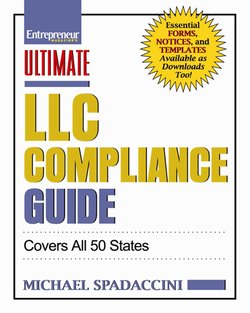Читать книгу Ultimate LLC Compliance Guide - Michael Spadaccini - Страница 12
На сайте Литреса книга снята с продажи.
HOW LLCS ARE GOVERNED
ОглавлениеLLCs can be governed in various ways; they are the most flexible types of business organizations in this respect.
Corporations, by statute, are required to be governed by representative management. In other words, corporations are governed by a board of directors who are elected by shareholders. (Close corporations are a partial exception to the rule of representative governance, but close corporation status is not available in all states and is hopelessly complicated.) A corporation’s directors may in turn delegate some of their powers and responsibilities to officers that they appoint.
General partnerships, on the other hand, are governed by their owners. The power and authority to operate and govern a general partnership fall upon the owners directly, without any representative management. The owners of a general partnership vote in proportion to their ownership interests.
LLCs can be governed either by direct management or by representative management. LLCs must always make an election to be governed by their owners (member-managed LLCs) or by an elected body or group of managers (manager-managed LLCs). A member-managed LLC is governed by its owners (members) equally, just like a general partnership. A manager-managed LLC is governed by one or more appointed managers. These managers need not be members of the LLC. A manager-managed LLC is managed much like a corporation, by an appointed body of persons other than the owners. The managers who undertake the governing responsibilities of an LLC can form a board or a committee.
▼ Free Resource
Learnaboutlaw.com maintains online question-and-answer forums operated by several practicing attorneys. Follow the links to “forums”; you can post questions for free and practicing lawyers will answer your questions or you can search the listed topics.
An LLC makes the election to be manager-managed or member-managed in either its articles of organization or its operating agreement. Some states dictate that the election to be manager-managed or member-managed be made in the articles of organization. Nevada is an example of a state where such an election is mandatory. Delaware, on the other hand, does not impose such an election.
If your LLC’s articles of organization do not require you to elect your form of management, you’ll make that election in your operating agreement. An operating agreement is a close equivalent of a corporation’s bylaws. Naturally, because a manager-managed LLC and a member-managed LLC are quite different, their operating agreements will differ greatly. LLC operating agreements cover matters such as who governs the LLC, how managers are appointed, how members can be ousted from the LLC, and such. Operating agreements, like bylaws, are not filed with the state. In fact, typically an LLC is not required to have any operating agreement in place, although it is advised. In the absence of an operating agreement, the LLC will follow the default rules of governance set forth in the laws of the state of organization. LLCs that operate without operating agreements are extremely rare. We discuss operating agreements in Chapter 3. In that chapter, we’ll also discuss the advantages and disadvantages of the two types of governance structure.
